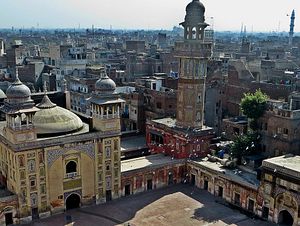At least 26 people were killed and over 50 injured in a suicide attack near a software technology park in Lahore at around 4 pm local time on Monday.
This is the fourth blast targeting Punjab’s capital in the past six months, after a protest and a market in the cantonment area were targeted in February this year, while a census team was attacked in April.
While the Charing Cross attack was claimed by the Pakistani Taliban faction Jamaat-ul-Ahrar (JA), the one in the DHA market wasn’t claimed by any group and has been touted as a “cylinder blast” by government officials. The April blast was claimed by Tehreek-i-Taliban Pakistan (TTP), which has also claimed responsibility for Monday’s bombing.
The Pakistani Taliban have intermittently targeted Lahore over the past seven years after a flurry of attacks rocked the city between 2007 and 2010. The attacks are part of the backlash against the state following action against the notorious Lal Masjid, which still houses the Islamic State-sympathizing Abdul Aziz, who has issued many direct suicide bombing threats to the state authorities.
With the Pakistan Muslim League-Nawaz (PML-N) ruling Punjab for the past decade, every time the Pakistani Taliban have wanted to strike the political nerve-center of the state, with the province the most heavily represented in the Army as well, a bulls-eye has been drawn over Lahore.
Initially the PML-N, spearheaded by the Sharif family, had managed to reduce Lahore’s volatility by reaching an understanding with the Taliban, wherein the party wouldn’t interfere in the jihadist umbrella group’s activities elsewhere as long as they didn’t target Punjab.
This also included alliances with Islamist political parties in the province, whose militant wings loudly confessed to a genocidal manifesto, openly calling for the ethnic cleansing of the Shia Muslims.
This political symbiosis with both the jihadists and Islamist parties meant that between 2010 and 2015, Lahore was largely shielded from terror attacks that continued to target the rest of the country with gruesome frequency.
The tide formally turned in November 2014, when the Pakistani Taliban – spearheaded by JA – targeted the Wagah border. The attack came after the formal launch of Operation Zarb-e-Azb against the Taliban factions in the northwest and tribal areas.
A month after the Wagah border attack, another Taliban faction orchestrated the Peshawar school massacre, which formalized Pakistan’s National Action Plan designed to target jihadist militancy in all shapes and sizes.
Since then, attacks in Lahore have been designed to test the government’s resolve on certain positions that the PML-N has taken, especially vis-à-vis religious minorities. Two of the biggest attacks over the last couple of years have targeted the local Christians – Pakistan’s second largest religious minority.
In March 2015 twin bombings targeted churches in the city’s Youhanabad area – a Christian locality that falls under Punjab chief minister Shahbaz Sharif’s constituency.
Last year’s Easter bombing at a children’s park in Lahore came after the government had hanged Mumtaz Qadri, a police commando who had killed Punjab’s former governor Salmaan Taseer for siding with the blasphemy accused Christian woman Asia Bibi. Following the 2016 Easter blast, the JA spokesman Ehsanullah Ehsan explicitly said the bombing was “a message to the Pakistani prime minister that we have arrived in Punjab.”
Both the civilian and military leadership have been endeavoring to earmark Lahore as a safe space where normalcy can be resumed in the shape of sustained peace. This has meant the Army ensuring security to international cricketers and footballers in two high-profile sporting events in Lahore this year.
The city is also scheduled to host an ICC World XI cricket side in September this year to pave the way for sustained resumption of international cricket in Pakistan, which was halted by an attack on the Sri Lankan team in the heart of Lahore in 2009.
The state is aiming to make Punjab’s capital the hub of sports and entertainment, while it claws its ways back into the driving seat in the rest of the country. Terrorists’ desire to spoil this particular plan of action is the latest in the long list of reasons why Lahore remains vulnerable to terror attacks, despite the city being treated as a virtual fortress. Aiming for police personnel on Monday carries obvious significance in a city trying to self-identify as Pakistan’s securest space.
For the Sharif family, the bombing comes at a time when the ruling party is jolted by the investigation into the Panama Papers corruption scandal, which could result in Prime Minister Nawaz Sharif’s ouster.
In targeting Lahore, the Taliban have not only sent out a warning that they’re far from being eliminated, contrary to what both the civilian and military leaderships have regularly claimed, but the TTP has also issued a reminder to the Sharif family of the utility of the Islamist political allies, should the Supreme Court deliver a verdict against them.
Even so, the most damning offshoot of Monday’s bombing is the reality that the one city that both the civilian and military leadership have unanimously vied to fortify has witnessed its fourth terror attack in six months. One can only imagine the control – or lack thereof – that the security authorities have over the rest of the country.

































